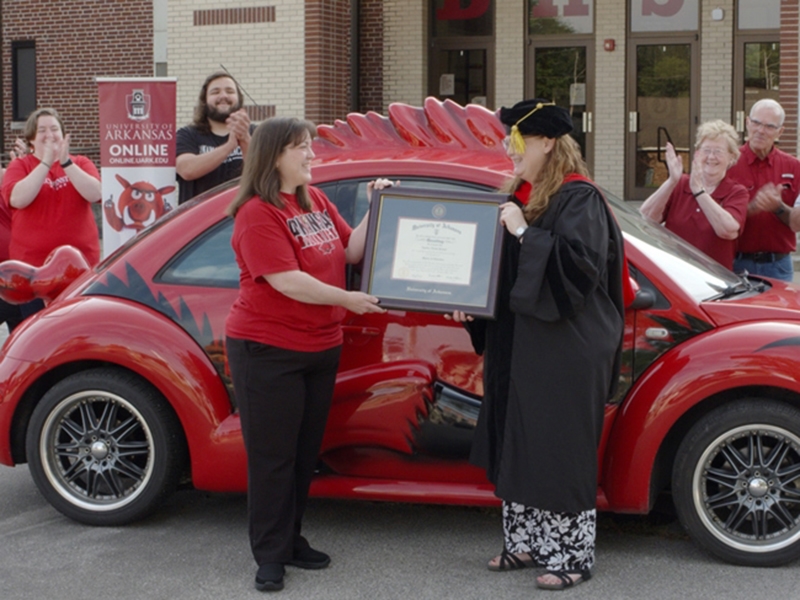
Candice Groves might not have a master's degree from the U of A if it weren't for the COVID-19 pandemic.
"I chose an educational technology master's degree because, with COVID, I got thrown into teaching online classes, and I didn't have a clue what I was doing," Groves said. "I felt like I was doing a disservice to my students, so I wanted to go back and learn how to teach online correctly."
Class assignments used various types of technology, she said, and she incorporated technology she was learning each week into her classes.
"I learned so much more than just teaching online; I learned tools I could use with my students," Groves said. "I learned so much from being a student in an online program about how I want to be an online teacher."
Groves earned a Master of Education in Educational Technology. She was honored on the last stop of the Razorbug Diploma Tour on June 28 outside Blytheville High School, where she teaches French and journalism. She had returned the night before from a trip to Europe with some of her students.
Her parents, who had not been able to travel to Fayetteville in May for the commencement ceremony, other family members, students, colleagues and friends, as well as a newspaper reporter, attended the diploma presentation.
However, along with the need to teach online that COVID brought, Groves also needed to learn online. In addition to her full-time teaching position at the high school, she works in an after-school program. She tried to earn a master's degree 10 years ago, she said, but it didn't work out for her to study in an on-campus program nearby. She's a longtime resident of Blytheville, which is in Mississippi County on the eastern border of Arkansas.
"I wasn't able to finish it because I would have had to stop working," Groves said. "This was the only way to get my master's degree, through an online program. It was perfect."
Planning is important for studying in an online degree program while keeping up with other responsibilities, she said.
"Every week, we would have our syllabus, and we would know what our assignments were going to be," she explained. "We would know when everything is due. Is this going to be a heavy assignment week? Is this going to be something you can take your time with? That way, I could plan everything that's happening during the week around my course schedule as well, and it just worked out."
The convenience was vital for her success, Groves said, and it was also fun to finally be a Razorback.
"It was wonderful to be able to work with the University of Arkansas to get this degree even though I'm on the other side of the state in Blytheville," she said. "I tell people I was born a Razorback, and now I've been able to graduate a Razorback. It's really a wonderful experience to be able to get an education through the University of Arkansas without actually having to uproot and move across the state."
The 2024 Razorbug Diploma Tour is in its third year. The 2005 converted Volkswagen Beetle with hooves, razor spine, curly tail and snout is the centerpiece of a ceremony repeated the past three summers in small towns across western, southern and eastern Arkansas.
The Razorbug was on loan from the Office of Admissions. Global Campus staff drove the Bug more than 2,100 miles to present 16 diplomas in 15 counties. Only two of the graduates earned bachelor's degrees. The rest were master's degrees and one doctorate. The U of A offers more than 90 degree and licensure programs delivered partially or completely online. In academic year 2024, the U of A awarded 1,013 online degrees and certificates.
Topics
Contacts
Heidi Wells, content strategist
Global Campus
479-879-8760,